Stockpiling survival items before the SHTF will prevent you from being among the panicked hordes of the unprepared. Waiting in line to pay price-gouging amounts for both common everyday items and crucial supplies would not only be costly and time consuming, but also potentially dangerous.
Knowing what you need before you need it is the key to spending money only on what you actually need – and not finding empty shelves in place of the necessary items.
The great run on toilet paper of 2020 due to Covid-19 is but one recent history example we should all keep in mind when organizing our prepping budget.
There are many natural or simple ways to live without toilet paper, but this rush to manic stockpiling clearly illustrates just how quickly items will disappear from stores and how rapidly price increases occur, during an emergency.
There were also more vital items that could no longer be found locally or in online stores during Covid, as well. Anyone who was seeking rubbing alcohol or everyday cleaning supplies was surely left disappointed.
Another Great Depression, a second pandemic, or a power grid down emergency could be looming on the horizon, with the duration of any given disaster situation entirely unknown.
Regardless of the reason which prompts an SHTF scenario, the basic stockpiling of item needs remains the same.
Medical Supplies
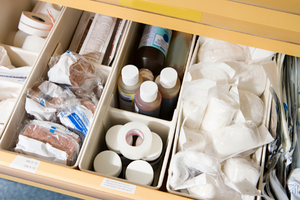 There will be three things immediately in short supply during a SHTF scenario: food, potable water, and medical supplies.
There will be three things immediately in short supply during a SHTF scenario: food, potable water, and medical supplies.
Purchasing and learning how to use the most advanced type of medical supplies that you can afford, might just save your life one day.
⇒ An Ingenious Way To Stockpile Prescription Medications At Home
While all preppers stockpile Band-Aids, rubbing alcohol, medical gloves, peroxide, and other common first aid kit items, go several steps beyond and purchase other legally available medical preps such as syringes, medical grade staples, needle and thread for stitching up a wound, IV bag and supplies, non-prescription medication and natural herbal alternatives, wheelchair, supplies to set a cast, as well as surgical and dental tools.
Even if the folks in your tribe do not know how to use surgical or dental tools, someone in your area may but not have access to their supplies and be willing to barter their services in exchange for food, water, or shelter.
Distilled White Vinegar
Vinegar is one of the best multipurpose and shelf stable survival items you can stockpile before a SHTF event.
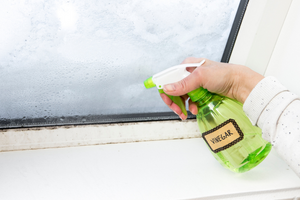
Not only can you use it to preserve food, distilled white vinegar is also a wonderful natural disinfectant.
You can use it to make your own cleaning products to help both rid and prevent germs.
Related: 50 Survival Uses For Vinegar
In addition to being used to can food to preserve it, distilled white vinegar can be added to regular milk to turn it into buttermilk for baking and cooking.
Rubbing distilled white vinegar directly onto the skin will help deter flies, mosquitos, and chiggers from biting you. While it stings, distilled white vinegar also helps to relieve the discomfort and itchy feeling after being stung or bitten by an insect.
Gently dabbing distilled white vinegar onto a sunburn will sting for a few moments, but may then soothe the sun burnt skin and help prevent it from blistering.
Firewood
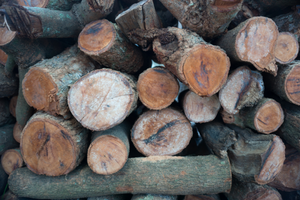 Even if you do not use a wood stove or fireplace now in your daily life, you must prepare for a time when cooking and heating may only be feasible with an open fire.
Even if you do not use a wood stove or fireplace now in your daily life, you must prepare for a time when cooking and heating may only be feasible with an open fire.
Freshly cut firewood is far less desirable than seasoned firewood that has had time to dry and cure.
Carrier Oils
During an SHTF situation you should never rely upon the ability to get professional medical help. The possibility of calling 911 or making an appointment to see your regular doctor quite likely will not be an option.
Carrier oils such as olive oil, coconut oil, arnica oil, almond oil, and even vegetable oil have been used in herbal remedies for centuries.
With a stockpile of carrier oils you can make salves, ointments, lotions, deodorant, poultices, and liniments.
Bleach
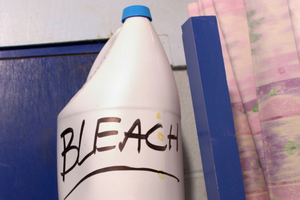 This common laundry product also has a plethora of uses during a SHTF scenario – ones far more important keeping your whites white.
This common laundry product also has a plethora of uses during a SHTF scenario – ones far more important keeping your whites white.
Bleach is a powerful disinfectant that can kill germs and help to keep household surfaces truly clean to prevent the spread of infections and disease.
Bleach has also been sparingly and carefully used to purify water during an emergency scenario.
⇒ Click Here For The Awesome DIY Device That Turns Air Into Fresh Water
Generators
You should have at least one generator and a stockpile of fuel to run it. Ideally, purchasing a generator that runs on a combination of gasoline, diesel, and propane would give you more options to stockpile fuel in a multi-purpose plan for use on other vehicles and mechanical devices at your survival retreat.
Being able to make your own biodiesel fuel to create a sustainable flow of fuel, is also wise. Solar generators also provide a sustainable source of power during a SHTF situation.
Canning Supplies
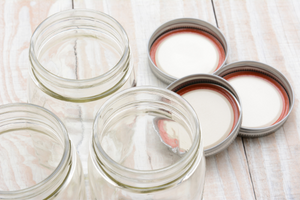 Preserving the food that you grow or barter for will help prevent you and your loved ones from starving during a long-term disaster.
Preserving the food that you grow or barter for will help prevent you and your loved ones from starving during a long-term disaster.
While Mason jars and rings are reusable, lids are not. You will also need a jar lifter, magnetic ring lifter, and seasonings.
Manual Kitchen Tools
Stockpiling manual kitchen appliances (can openers, potato masher, grain grinder, mandolin, whisks, egg beaters and the like) will allow you to keep on preparing food even if plugging a gadget into the wall will no longer produce results.
Emergency Lighting Supplies
Stockpile portable light sources such as candles, flashlights (and ample batteries) , solar powered landscaping lights, oil lamps, wicks, mantles, and lanterns.
Prepare to light your own path not just with flashlights and batteries, but also with a more old-fashioned approach.
Composting Commode
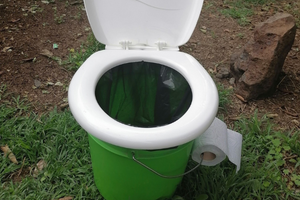 A composting commode, a 5-gallon bucket with a toilet seat on it, or even a properly created old-fashioned outhouse will provide the members of your household with a sanity place to use the bathroom.
A composting commode, a 5-gallon bucket with a toilet seat on it, or even a properly created old-fashioned outhouse will provide the members of your household with a sanity place to use the bathroom.
If you are a rural prepper odds are that you have a well.
When the power goes out you will no longer be able to flush the toilet once the water pressure in the well bladder has been used – unless you have a generator to power the well or a manual dipper.
Suburban and urban folks also should not depend on modern municipal utilities to continue working weeks, if not mere days, into an emergency scenario. Human waste improperly disposed of creates insanitary conditions that will not only attract rodents but can breed disease.
Reloading Supplies
All of the guns that you have already stockpiled will become fairly useless hunks of metal once you use all of the ammunition that has also been diligently tucked away.
Stockpile reloading supplies and learn how to reload your own ammunition so you can continue to protect yourself and hunt for meat during an SHTF event.
Duct Tape
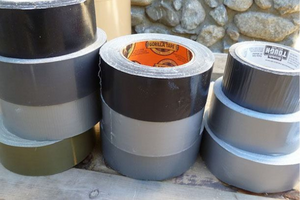 There are dozens if not hundreds of uses for duct tape, but inside your home and during a bugout scenario.
There are dozens if not hundreds of uses for duct tape, but inside your home and during a bugout scenario.
Duct tape can be used to turn a trash bag into an emergency shelter, to temporarily fix a leaky pipe, a pair of worn out boots, and to repair a whole in a flotation device.
Communications Devices
Stockpiling communications devices to receive and even send information with the outside world will help you keep as up to date as possible of potential dangers coming your way.
Related: What Is The Best Ham Radio For Preppers?
It will also help you to make contact with loved ones, and to be aware of what were once mundane natural weather issues that could greatly impact your safety in a world without first responders to call for help.
Stockpile and learn how to use and maintain a solar powered emergency radio, 2-way radios, CB radio, or a HAM radio. Store the radio equipment as well as supplies and tools to operate and repair the radio in a Faraday cage to protect them from possible EMP exposure.
Seeds And Manual Gardening Supplies
Stockpile heirloom seeds that can be stored properly and remain viable to get you through the next growing season – when you can collect and save another round of seeds from your harvested garden crops.
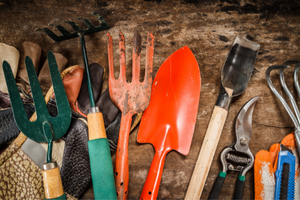 Even if you have a diesel powered tractor and the ability to create your own biodiesel fuel, stockpile manual gardening tools.
Even if you have a diesel powered tractor and the ability to create your own biodiesel fuel, stockpile manual gardening tools.
This way you will you have a dependable and durable manner in which to cultivate vegetable crops and medicinal herbs to make your own remedies.
⇒ Click Here To Get The 10 Medicinal Plants You Need To Have In Your Backyard
When stockpiling crucial and necessary supplies in preparation for a SHTF scenario, remember the highly accurate survival motto: one is none and two is one.
Possessing on a few bottles of peroxide and a couple packets of seeds will not increase your odds of being a survivor.
Reference and Self-Reliance Books
Unless you are blessed to be the one person who knows everything about everything, or have a huge survival tribe with experts in the most vital aspects of self-reliance living, stockpile books that can help you accomplish essential tasks.
Creating a prepper library covering topics such as: butchering, herbalism, foraging, auto mechanics, alternative power, gun repair, gardening, livestock husbandry, for example, would offer knowledge and skill building that will be necessary during a long-term disaster.
Once you have adequate knowledge to mastery of a given subject, cross-train others in your family or group.
Create an SHTF preps stockpiling list with your family or survival group to both determine what you need and how much of each item will likely be necessary during a disaster of varying duration.
Keep an inventory of your items, even the ones that are almost permanently shelf stable so when an item is used, passes a reasonable expiration date, or becomes broken, you can quickly make plans to replace it.















Good to see I’m mostly sorted.
I haven’t bothered with plaster bandages to make casts (but do have some thermo plastic that could be used to make a longer term splint (and emergency splints). Having broken several bones in my life I’m aware that a splint and well placed bandages can work in various stages, and then using something like a clay mud/daub could work as effectively as plaster (and is locally available on my land already). Plaster bandages are great, but I’ve got other things on my shopping list first. Like syringes. They are higher priority.
Wonder if a combination of wood splints and duct tape would work?
The idea is to stop the bones shifting while they knit/repair.
But there’s a huge amount of swelling immediately after a break, so any ‘cast’ then needs to be replaced within a week or so when the swelling goes down (and you don’t want a tight one on too quick either!). And it might need further replacements over time depending the condition of it and the type of fracture.
And if you’ve ever seen what it’s like after removing a cast that’s been only even just for a couple of weeks (gross! Flaking skin and all sorts of ugly!) and there was any risk of infection (any break to the skin under the cast) you’ll want something removable.
Maybe doing some extended reading on bone setting and fracture and sprain first aid is wise, it’s not complicated usually but it’s important to get it right, and a fracture or sprain is catastrophic in SHTF.
And duct tape and wood splints could work, as a longer term one, but immediately after a break I’d go with vet wrap/self cohesive bandage and wood sticks. It is reasonably firm, but can be loosened and tightened.
Sandgroper, I bought a few glass syringes on eBay which can be autoclaved for reuse. Needles are harder. I have disposables for everyday use since we have livestock but I try to have more needles than we are likely to need. Same with surgical tools. I bought a small readymade surgical kit in a zip up folder with scalpels, forceps etc and expanded it with more blades, suturing gear etc. everything in stainless steel for sterilisation.
For Suture thread I have collected various types including dental floss but I’m not sure which is best. I haven’t been able to get staples recently either. So far I’ve just done animals and supaglue has been the most useful for those superficial cuts. There is a bit of this type of gear available for owners of pig dogs since the feral pig hunters need to patch their dogs on the go in the wilderness before they can get to a vet.
Forgot to say that sheep and cattle vaccine injections are reusable and can be sharpened but not sure that they fit on a standard syringe. They don’t come small gauge though.
if you don’t home preserve food by canning – don’t have a pressure canner – it can be used as an emergency autoclave for med sterilizing >>> DIY application to keep in mind
Thanks Ginny/ fellow Sandgroper.
I’ve got a bunch of sutures and surgical tools, but I’ve been wary of syringes. Next on my “work this out” list! I want a range of gauges, and reusable safely is ideal, but also disposable could be good for some situations. And obviously you never want to share them, but by the time the SHTF to the point that you are carrying your own needles to a hospital infection control has to be pretty bloody dubious everywhere!
Always remember not to be in front of the fan.
DON’T FORGET THE TOILET PAPER! The Corona Sharona Bolonga taught us how fast the TP will dissappear. Not going thru that again! The Queen has a stockpile for her throne!
Personal wash cloth, preferably with your name on it. Using someone else’s cloth is a cardinal sin.
Everyone having a different color would help to keep others from using yours.
All over Asia they rinse with water and then dry, they never wipe a dirty bum. Many have a spray hose (Bum gun) like on your kitchen sink you use to rinse your dishes but hanging on the wall nest to the toilet. You simply spray your bum clean the dry with TP, or air dry, it’s how in south Asia…
Also family cloth. the euphemium for 4×8′ cloth to wipe. Dump in a bucket with water/bleach. Used these for a month AND washed them to prove the method works. cut your own from old clothes. of yes, keep old clothes til not usable, then use the reminants
Why? One would hope these are single use each time and will be washed and boiled or disinfected thoroughly between uses. No different to the old cloth nappy/diaper we used on children. And as a guide we had 3 dozen per child if I could afford it; 1 doz washing, 1 doz drying, 1 doz in use that day. That allowed for bad weather and drying taking so long in front of the fire. Summer was much easier.
some readers will need an explanation of “wash cloth” – if you travel overseas – take your own personal one along >>> it’s more American than worldly known
The author left out one use for distilled white vinegar: combined with sodium bicarbonate (baking soda), it makes a dandy drain opener. Did you know you can get bicarb at your local feed mill? — a 50-pound bag of it may have gone beyond $16 now, due to inflation, but it’s still a saving over the little boxes you can buy at the grocery store.
I keep diatomaceous earth (Red Lake Earth) on-hand as well. It’s effective against intestinal parasites, fleas, roaches, and other creepy-crawlies. (We won’t have to worry about our vacuum cleaners ATSHTF, but for right now don’t try to vacuum the stuff back up! Sweep only!)
I purchased your online version last year and would like to get a HARD COPY of you book, and have tried to contact you guys numbers times.. can someone email me with instruction and the added cost to get the hard copy?? PLEASE!!!
Clint
Go to the top of this page and you will see an Icon that says STORE, push on that and it will take you to the place you can order the hard copy that you want.
stay sharp
Having papermaking of the local and surrounding area can be important…don’t expect cellphones and GPS to necessarily work.
Paper maps…maps…
Absolutely. I’ve been meaning to get one of those trucker map books. They generally have the whole interstate system plus state highways and a few back roads, plus some inset maps with details of larger cities. That kind of a thing might be handy someday.
better than just a McNally road atlas >>> DeLorme map atlas is what you want of your individual state – everything is broke down by the county – that goat path road that only the local natives know about >>> shows on the map
Atlas Map
JB Weld is good !
This list is interesting. It’s supposed to be what disappears FIRST. Yet it doesn’t mention paper or hygiene products like paper towels, feminine products, diapers (other than TP), camping supplies, ALCOHOL, GASOLINE, WATER or TOBACCO! Those are quicker to be snatched up than canning supplies, firewood or carrier oils. Most people couldn’t even tell you what a carrier oil is and the majority of homes here, even in Canada, do not have a fireplace. There have been similar articles here with much better lists.
I was thinking what disappears first as being most people’s inhibitions, common sense, respect, law and order, and the thin veneer of politeness that the average human has today.
There’s a sticker floating around that says, “expect to self-rescue”, pretty much sums up the mindset among people who are seriously preparing.
ITEMS THAT DISAPEAR FIRST ??
In the early days of covid I felt I was short on my supply of yeast, I spent a lot of time finding some, and was very glad when I did. An other item I was low on was 409 cleaner, I just did with out for a long time. Didn’t have any medical emergency during that time period but I have decided to improve my first aid kits. You live and learn.
after you get your home First Aid kit prepped and ready for action >>> look to the next med plateau to conquer ….
the hospitals & clinics will be overwhelmed and forced to close – close thing with COVID >> the personnel will survive to roam the wasteland – having tools & med supplies for them to utilize in an emergency among your family/group will give you a leg up – check on the prepper sites and DoomsDay Docs for a recommended list …..
Well everyone should be buying a Daniel Defense MK 12 rifle with a YHM suppressor light and laser setup. Along with a LVPO 1 to 8 vortex viper
LOL go ahead buy a super toy.
Somebody with a rusty 22 is going to be the new owner when your too tired or busy to notice them.
Teamwork, skills, a fair bit of luck and then STUFF gets you through bad times
Guy with the 22 can’t outgun my crew. We have third gen nvds and thermals. Plus you ever heard of front sight. Well we went and graduated
LOL
Nuff said
Info I live in the U.K. so don t have legality to have weapons also we r unable to buy large tins of anything and canning equipment etc is far too expensive here
Make sure you take note of everything your cities have and where the food stocks are kept
Good point. Knowing where the stockpiles are is part of your prep. And not just the stockpile for the major supermarket chains, but the pharmacy supply logistics companies, the Asian grocer supply warehouse, the fresh fruit/growers market warehouse and grain.
Schools and nursing homes/health facilities and prisons have a lot of food often, anywhere that has mass housing/meals. The quality might be rubbish, and the guards might shoot so avoid the prison stuff, but think creatively.
Re toilet paper/paper towel etc. There’s plenty of alternatives to all of that, start to work them out now. It’s bulky to store, it’s convenient but expensive compared to a cotton towel, and it’s only ‘half good’ at most of it’s jobs. Get some plain cotton tea/dish towels and use that instead for wiping benches or soaking oil out of meat. Wash on a hot medic wash with soap and use again. And then when SHTF you have one less thing to think about. (Family cloth? You do you. You could also get a bidet attachment to you can put on the toilet, and then you just need a bottom dry towel, different colours for different people is wise, but if the real SHTF has hit, toilet water is wasteful, toilet paper is wasteful, and you probably need to think smarter.
It’s heartening to see reference and self reliance books on this list. I’ve been busy building a little home library with how to books. If you don’t have any, the best place to start is with The Lost Ways Books! I am most fortunate to have a complete set of these books and they are a handy guide and reference for just about anything one could ever need to look up and read in the preppier department! With everything going on now, it is important to cover all bases, so have included a section on US and world history. My pride and joy in that section is the Funk & Wagnalls Encyclopedia I bought years ago for my kids in school. I cant bare to part with a book and refused to throw it out as it accurately covers things up until 1990. I’m glad I kept it as all of the information is historically correct. Nothing woke in my little library!
I feel like I will never be prepared enough for a crisis